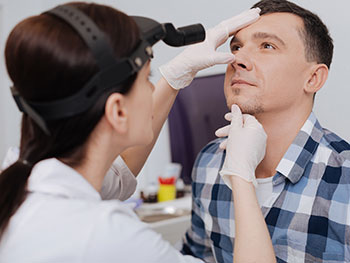Sinusitis is one of the most common illnesses occurring in the United States. The Division of Rhinology and Endoscopic Skull Base Surgery at Upstate provides a complete range of services for medical and surgical management of sinusitis, allergic rhinitis, and management of tumors of the sinonasal cavity and the anterior skull base.
 Upstate Otolaryngology offers the full range of allergy, medical, as well as minimally invasive endoscopic surgical management of diseases of the nose and sinuses. Surgical options for sinusitis include Functional Endoscopic Sinus Surgery (FESS), a minimally invasive, typically outpatient technique used to open and restore normal drainage, ventilation, and function of the paranasal sinuses in the setting of chronic allergic and/or infectious sinusitis. Minimally invasive techniques can also allow endoscopic surgery for removal of cancerous and non-cancerous tumors of the nose, sinuses, anterior skull base, and for repair of cerebrospinal fluid (CSF) leaks from the nose. Upstate surgeons use cutting edge technology including powered instrumentation and drills, computerized intraoperative navigation/image guidance, and balloon sinus dilation.
Upstate Otolaryngology offers the full range of allergy, medical, as well as minimally invasive endoscopic surgical management of diseases of the nose and sinuses. Surgical options for sinusitis include Functional Endoscopic Sinus Surgery (FESS), a minimally invasive, typically outpatient technique used to open and restore normal drainage, ventilation, and function of the paranasal sinuses in the setting of chronic allergic and/or infectious sinusitis. Minimally invasive techniques can also allow endoscopic surgery for removal of cancerous and non-cancerous tumors of the nose, sinuses, anterior skull base, and for repair of cerebrospinal fluid (CSF) leaks from the nose. Upstate surgeons use cutting edge technology including powered instrumentation and drills, computerized intraoperative navigation/image guidance, and balloon sinus dilation.
Upstate physicians are well-versed in treating fungal sinusitis, including allergic fungal sinusitis (AFS-a difficult form of sinusitis characterized by polyps, thick allergic nasal and sinus mucous, and allergic inflammation to fungus found in the sinuses) and sinus fungal balls (a collection of fungus sometimes found in one or more sinuses). AFS and fungal balls almost universally require endoscopic sinus surgery, and AFS in particular requires long-term medical management and surveillance.
Minimally Invasive Pituitary Surgery and Expanded Endoscopic Approaches to the Skull Base
Upstate Otolaryngologists partner with Neurosurgeons to perform Minimally Invasive Pituitary Surgery (MIPS). This minimally invasive approach uses an endoscopic approach entirely through the nose and sinuses to remove pituitary tumors. In contrast to open approaches to the pituitary gland, the access to the pituitary endosocpically through the sinuses allows access with no facial, oral, or external cranial incisions, reducing the morbidity of the procedure and allowing faster healing. Visualization with the endoscope makes tumor resection by the Neurosurgeon potentially more complete given the ability of the endoscopes to see behind and under otherwise obstructing structures in the sellar region. Additionally tissue grafts and flaps from inside the nose can be used to repair cerebrospinal fluid leaks if they occur during pituitary surgery, and these have a high success rate and low morbidity.
Minimally invasive endoscopic approaches can also be utilized to remove benign and malignant tumors of the sinuses and anterior skull base that might otherwise require more morbid open approaches. These tumors include inverted papillomas, sarcomas, esthesioneuroblastoma, and others.
Treatment of Snoring and Obstructive Sleep Apnea
Snoring is a common problem affecting many patients. Endoscopic surgery can be used to correct septal deviation and can significantly improve snoring for many patients when septal deviation is present. Treatment of septal deviation can also make CPAP (continuous positive airway pressure) devices more comfortable and efficient to use.
Septoplasty
Septoplasty consists of manipulation of the bone and cartilage of the center wall of the nose, allowing for the repair of deviations causing nasal obstruction. This typically outpatient operation offers a relatively straightforward recovery and a well-tolerated post-operative course. In some cases the procedure may be combined with turbinate reduction allowing for the reduction of the bulky tissues on the side wall of the nose, or even tonsillectomy and/or adenoidectomy.
Upstate Otolaryngology offers a comprehensive range of nasal, sinus, and anterior skull base procedures for nasal, paranasal sinus, and anterior skull base pathology.
Balloon Sinuplasty
At SUNY Upstate, we are excited to offer minimally invasive treatments for chronic sinusitis in the office setting.
This has become an increasingly popular option for many of our patients who are suffering from chronic sinusitis, as it allows faster recovery and fewer risks than traditional sinus surgery in the operating room.
Office treatment often involves using small balloons to dilate the natural sinus drainage pathways, reducing daily symptoms and infections.
Smaller, custom tools designed for the office setting allow us to improve sinus drainage pathways under just local anesthesia with minimal discomfort.

